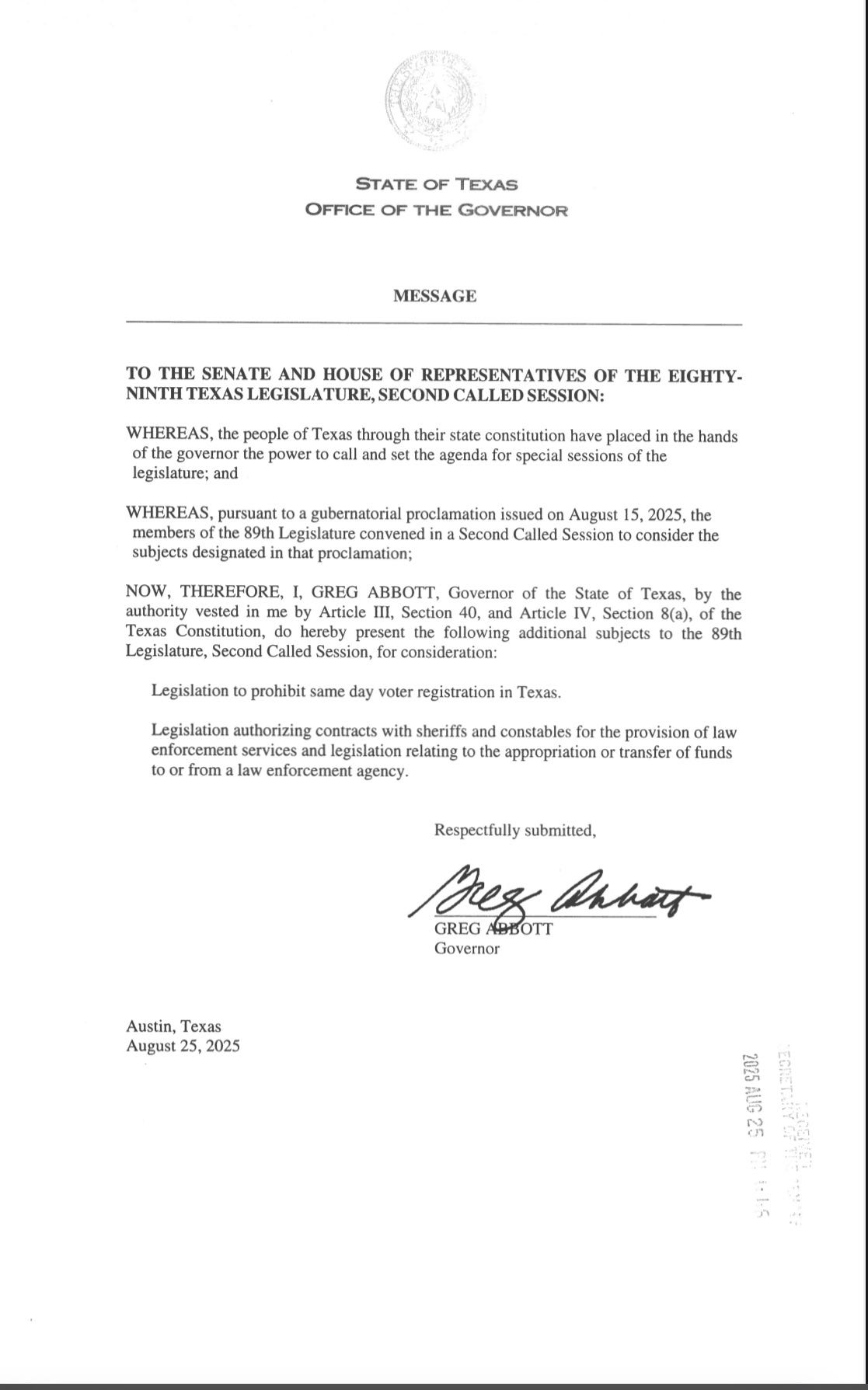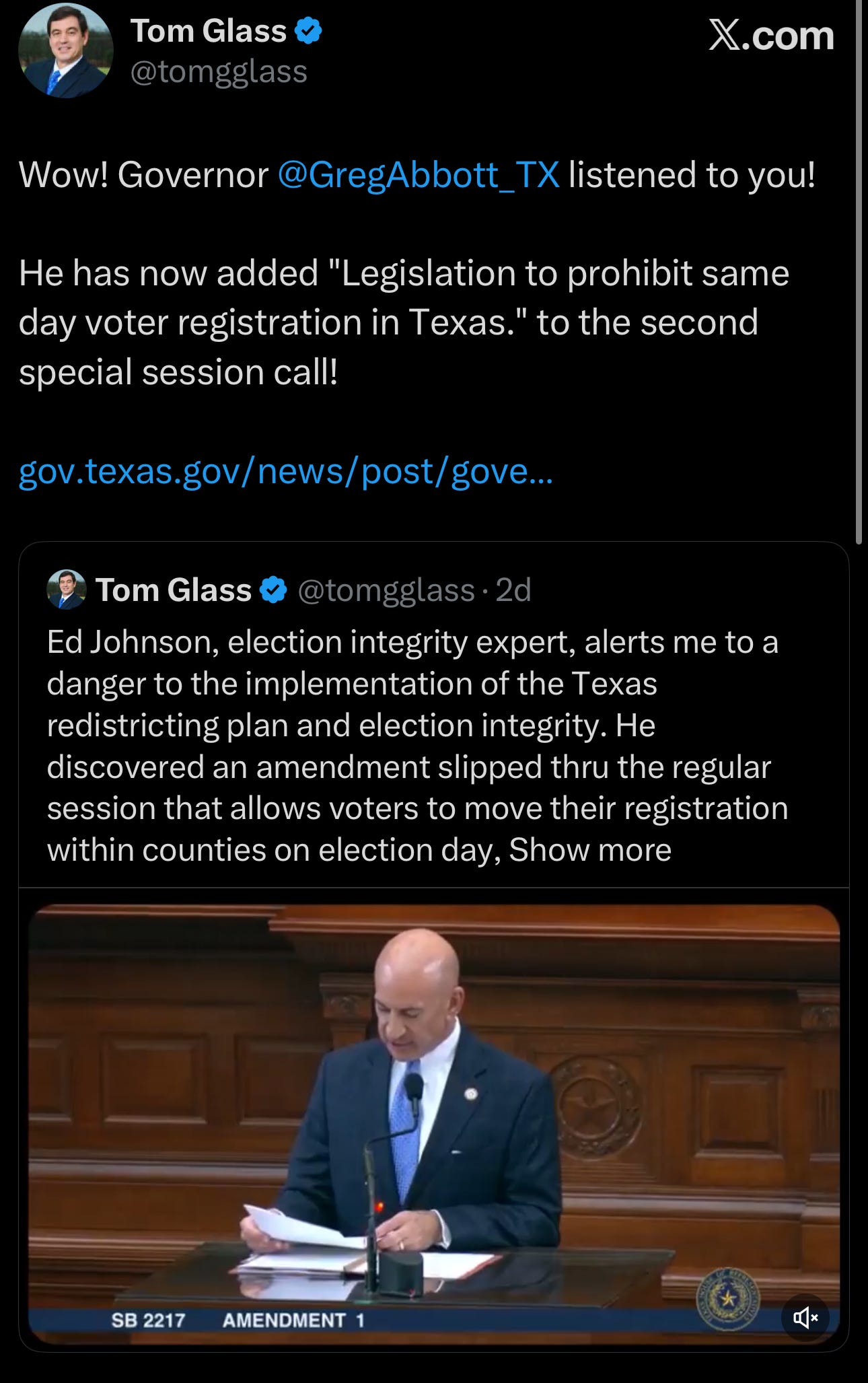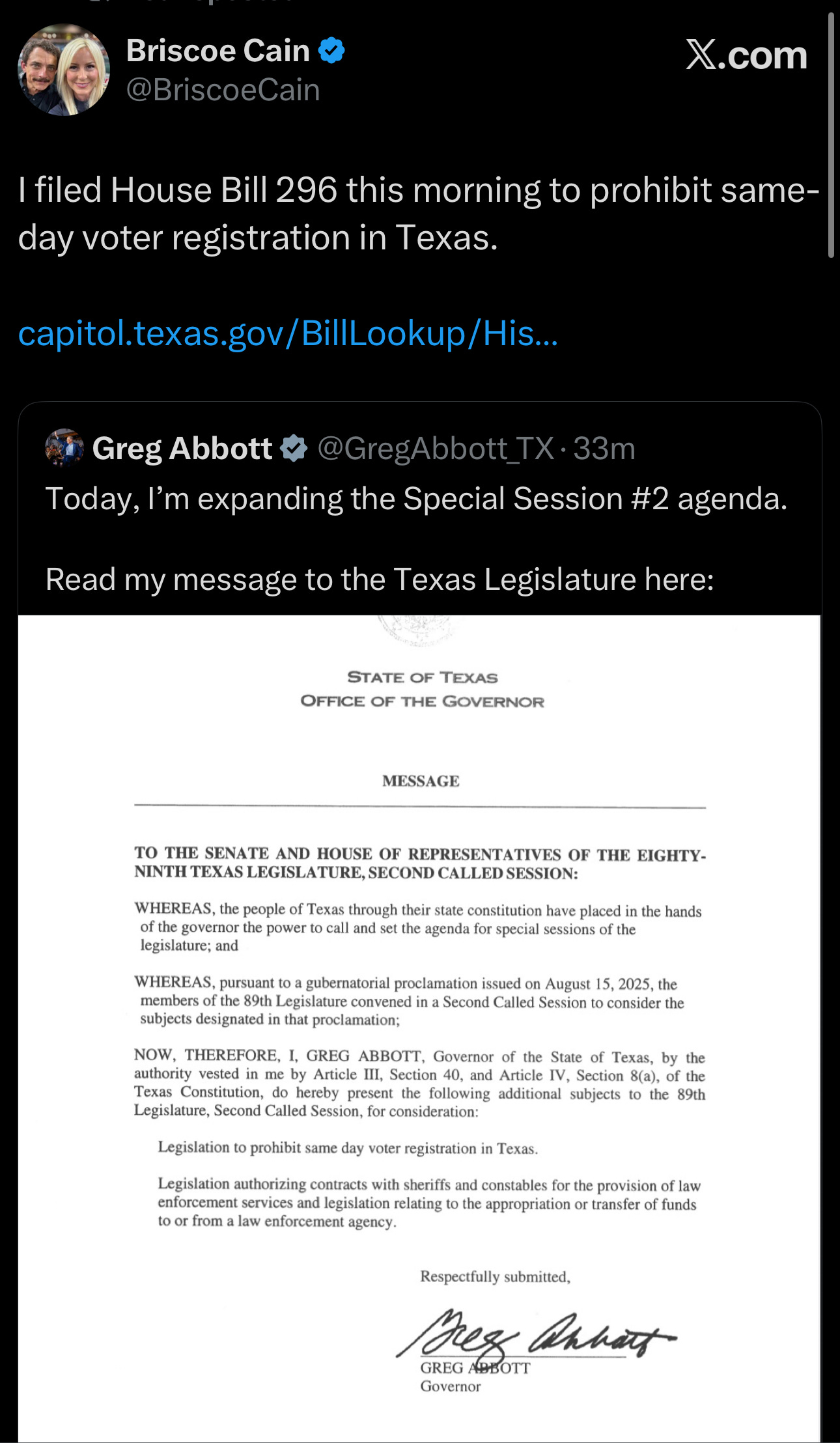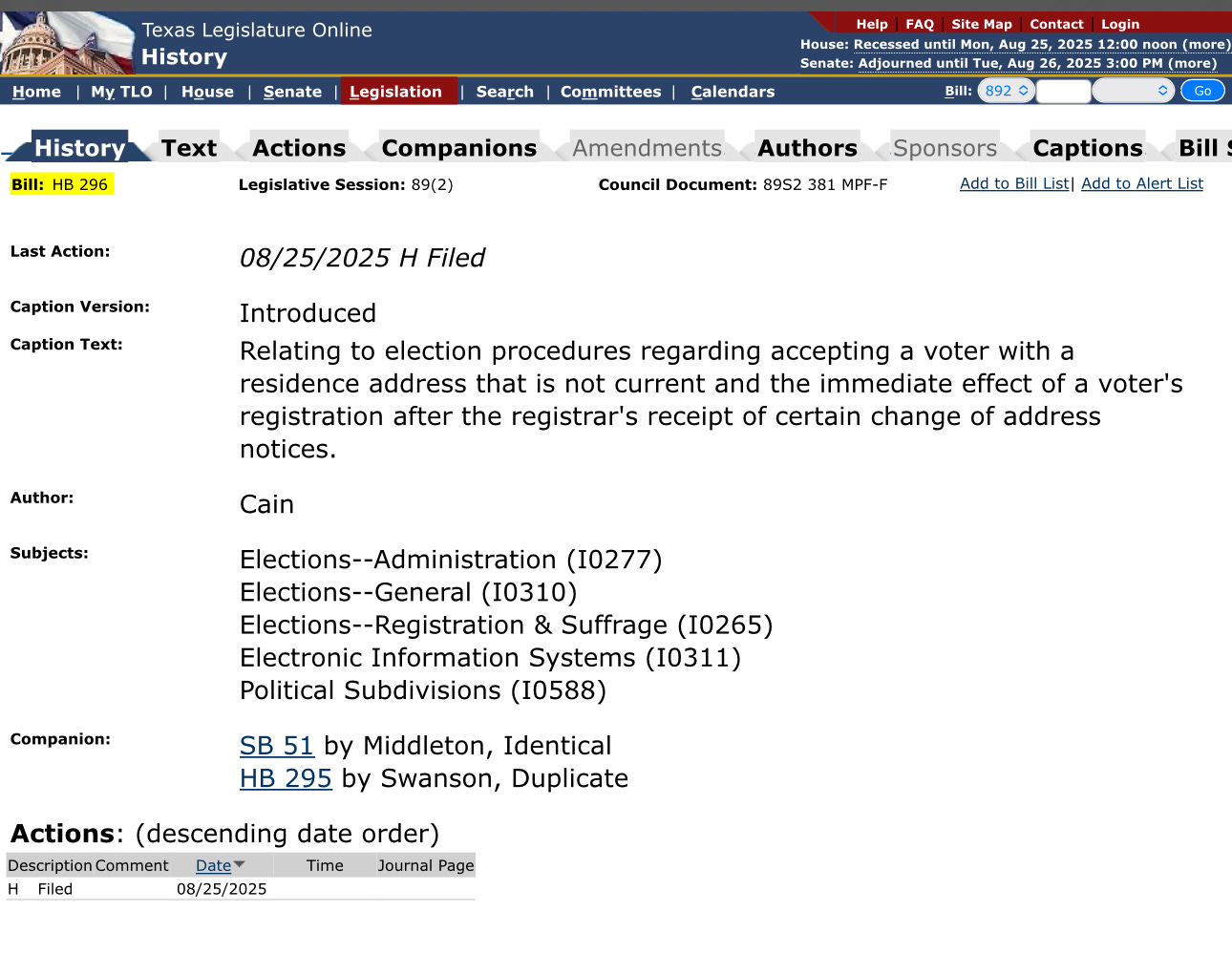Abbott Expands Special Session Agenda Adding to Prohibit Same-Day Voting and Shift Control of Contract Policing
In a move hailed by election integrity advocates, Governor Greg Abbott has expanded the agenda of the 89th Texas Legislature’s Second Called Special Session to include a prohibition on same-day voter registration. The announcement, made earlier today, was quickly spotlighted in a Twitter post by Tom Glass, a prominent Republican candidate for Texas House District 17 and founder of Texas Constitutional Enforcement. Glass’s post, which garnered hundreds of thousands of views within hours, credits public advocacy for prompting the governor’s decision and ties it to concerns over a recently discovered vulnerability in state election law.
Glass detailed how election integrity expert Ed Johnson uncovered an amendment to Texas Election Code Section 15.025(e). This section allows a voter’s registration to take immediate effect upon the registrar’s receipt of an intra-county address change notice, even on election day. Critics, including Glass and Johnson, argue this creates a loophole for “organized efforts to swamp one district with voters from another in big counties like Harris or Dallas,” potentially distorting redistricting and enabling fraud.
Glass’s August 22 thread urged Texans to contact Abbott’s office via an online form, providing sample language to repeal the provision and ban immediate registration changes within 30 days of an election. He framed the issue as evidence of “cooperation between the Dems and the Burrows team to thwart election integrity,” referring to House Speaker Dade Phelan ally Dustin Burrows and alleged uniparty dynamics in the legislature
Glass’s follow-up post celebrated the governor’s response, implying that widespread constituent outreach—spurred by his alert and groups like Texas Constitutional Enforcement—played a key role. The post has received 19 likes, 6 reposts, and 3 replies as of this evening, reflecting a mix of support and skepticism.
Governor Abbott’s Agenda Expansion
The governor’s proclamation, issued earlier on August 25, formally adds two items to the special session, which began on August 15:
1. Legislation prohibiting same-day voter registration, directly addressing the concerns raised by Johnson and Glass.
2. Measures authorizing contracts with sheriffs and constables for law enforcement services, including fund appropriations or transfers.
Abbott’s office emphasized the need to safeguard Texas elections, stating in the news release that these additions build on the session’s existing focus areas, such as water resource protection. The move comes amid Republican efforts to enhance election security following the 2024 elections, where Texas saw record turnout but ongoing debates over voter rolls and access.
Johnson, who met with Abbott on August 21 to discuss the SB 2217 issue, has been credited as a pivotal figure in elevating the problem. His expertise in election procedures has influenced prior reforms, and this latest push underscores fears of coordinated voter shifts in populous counties.
The agenda item has already spurred legislative action. On the same day, Rep. Briscoe Cain (R-Houston) filed HB 296, which refines procedures for accepting voters with outdated addresses and ensures immediate registration effects only under strict conditions. Its Senate companion, SB 51 by Sen. Mayes middleton. Texas House Bill 296 introduced by Rep. Briscoe Cain during the 89th Legislature’s 2nd Called Session on August 25, 2025, refines the Texas Election Code to enhance election security while preserving voter access. This bill addresses weaknesses in voter registration updates, particularly for intra-county address changes, by repealing a provision allowing immediate registration updates. Compared to Senate Bill 2217 (passed in the 89th regular session, effective September 1, 2025), HB 296 offers stronger protections against fraud, clearer administrative processes, and more consistent residency rules. Below, I outline the bill’s key provisions and their improvements, based on the introduced text.
1. Eliminating the “Immediate Effect” Loophole for Address Changes
- Issue with Current Law: Senate Bill 2217’s Section 15.025(e) allows intra-county address changes to take effect immediately upon registrar receipt. Election integrity advocates, such as Ed Johnson and Tom Glass, warn this creates a vulnerability, potentially allowing coordinated last-minute address changes in large counties like Harris or Dallas to influence local elections or redistricting. While intended to simplify updates, this provision risks insufficient verification, increasing fraud or error potential.
- HB 296’s Improvement: By repealing Section 15.025(e) (Section 3) and amending Section 15.025(a), HB 296 imposes a 30-day waiting period for most registration changes, except for specific cases like court-ordered updates or military voters (Subsections (b) and (d)). This delay allows registrars to verify updates using tools like the National Change of Address (NCOA) system, reducing risks of manipulation, such as voters temporarily “relocating” to sway precinct outcomes. Aligned with Governor Greg Abbott’s August 25, 2025, proclamation banning same-day voter registration, HB 296 strengthens security without disenfranchising eligible voters, offering a more robust process than SB 2217.
2. Simplifying Voting for Non-Current Addresses
- Issue with Current Law: Section 63.0011 allows voters with outdated addresses to vote provisionally or in their old precinct after submitting a statement requesting an address update. However, SB 2217’s immediate updates can bypass thorough checks, risking ineligible votes or administrative backlogs from election-day processing.
Amendments to Sections 63.0011(b) and (c) clarify that voters who moved within a county can vote in their registered precinct if they meet residency requirements for the county or relevant political subdivision. By removing the requirement for voters to request an immediate address update in their statement (deleting Subsection (c)(4)), the bill focuses the statement on affirming residency and providing application-like details (per Section 13.002). This change:
- Reduces election-day workload for poll workers, minimizing errors and delays.
- Strengthens verification by processing updates post-election with a 30-day review, enhancing fraud detection through audits or challenges.
- Ensures consistency by allowing eligible voters to participate without rushed updates, reducing disputes over residency.
This approach improves on current law by balancing accessibility—Texas has over 18 million registered voters with strong turnout—with security, potentially lowering the 1-2% provisional ballot rejection rate by clarifying
- Preventing Manipulation: HB 296’s 30-day rule counters SB 2217’s loophole, which could enable strategic voter migrations in urban areas to distort representation. This safeguard is particularly effective for less-than-countywide elections, tying eligibility to territorial boundaries.
- Protecting Legitimate Voters: The bill applies only to updates submitted on or after its effective date (Section 4), avoiding disruptions for existing records. Voters can update addresses via mail, online, or in-person, with changes effective after 30 days—sufficient for most moves. This targeted approach is less restrictive than stricter proposals in other states, maintaining access while addressing vulnerabilities.
- Improving Efficiency: By leveraging Texas’s statewide voter database, HB 296 enhances data accuracy and audit reliability compared to manual processes. It reduces election-day confusion, lowering costs for local governments and improving operational efficiency over the current system.
HB 296 delivers a more secure, streamlined, and equitable voter registration process than SB 2217, effectively addressing fraud risks while supporting voter participation.
Glass, a 2026 candidate for House District 17 and a Texas A&M graduate, has positioned himself as a grassroots advocate through initiatives like Protect the Texas Grid and the 2022 RPT Platform Committee
.





Thank God. Enough crooked D voting in Houston